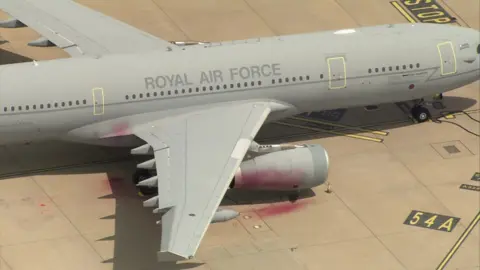The planned proscription of the Palestine Action group by the UK government has sparked significant controversy and concern. According to reports, the Home Secretary, Yvette Cooper, is set to formally categorize Palestine Action as a terrorist organization in the coming weeks. This decision will potentially render membership in the group illegal, amplifying the already existing tensions surrounding the issue of Palestine and Israel in political discourse.
The news of this drastic measure follows a recent incident at RAF Brize Norton in Oxfordshire, where activists from Palestine Action managed to breach security and vandalize military aircraft. During the early hours of Friday, they sprayed red paint onto two military planes, leading to an immediate response from both counter-terrorism units and local law enforcement. Prime Minister Sir Keir Starmer expressed his disapproval, condemning the act as “vandalism” that undermines public safety and respect for military operations.
As a direct consequence of this incident, a comprehensive security review has been initiated across military bases in the UK. Thames Valley Police confirmed that they are conducting an inquiry into the breach at RAF Brize Norton while collaborating with military police and the Ministry of Defence to assess the full extent of the damage caused. Initial evaluations indicated that the operations of the air-to-air refueling aircraft, essential for various military engagements, may not be significantly affected.
In an unsettling video released by Palestine Action, activists are depicted infiltrating the airbase under the cover of darkness, with one member reportedly using a scooter to approach an Airbus Voyager, where they sprayed paint into the jet engine. With this daring move, the group claimed responsibility for putting critical aircraft out of service, emphasizing their message against the UK’s military support of Israel. They argued that despite public condemnation of Israel’s actions, the British government continues to provide military aid and operational support to the Israeli forces.
The actions of Palestine Action are not isolated incidents; they form part of a broader strategy to disrupt operations that they believe enable military aggression. For context, RAF Brize Norton is not just a random target but serves as a vital hub for UK military logistics, including strategic air transport and refueling missions. This base is instrumental in operations extending from air support over Gaza to exercises involving other international military allies stationed in the region.
However, the push towards designating Palestine Action as a terrorist organization raises profound questions about freedom of speech and the right to protest. Critics argue that such moves will stifle legitimate dissent and discussions about the UK’s foreign policy and its role concerning Palestine. They express concerns that labeling activists as terrorists could lead to severe repercussions, including criminal charges against ordinary citizens who may wish to exercise their democratic rights to protest or advocate for a cause.
As the government prepares for parliamentary discussions, the varying reactions from political parties, human rights organizations, and the general public will likely influence the discourse going forward. The implications of these actions will inevitably touch upon broader issues of civil liberties, as well as the ongoing conflict between pro-Palestinian activism and the government’s security policies.
In conclusion, the situation surrounding Palestine Action and the government’s response highlights the complexities at the intersection of civil rights, national security, and the geopolitical landscape of the Middle East. The decision to potentially ban a group committed to activism for Palestinian rights could set a precedent for how dissent is treated in the UK, particularly concerning issues tied to international relations and humanitarian concerns.



